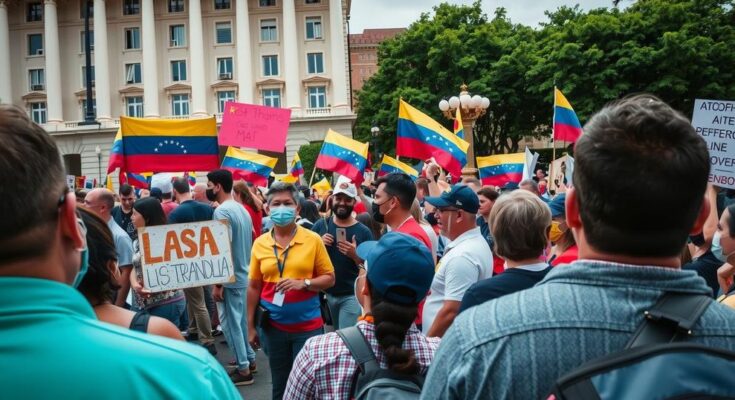Six Venezuelan government opponents at the Argentine embassy in Caracas reported heavy police presence outside the embassy, prompting international condemnation. The U.S. and Argentina view these actions as violations of international law, complicating the already strained diplomatic relations in the context of Venezuela’s political unrest.
The situation in Caracas escalated over the weekend as six Venezuelan political adversaries taking refuge in the Argentine embassy reported heavy police presence outside their temporary sanctuary. These individuals, primarily from the Vente Venezuela party under the leadership of María Corina Machado, asserted that local police and intelligence personnel had been stationed around the embassy for hours, which Argentina’s Foreign Ministry condemned as harassment. The United States echoed these concerns, highlighting that such actions represent a serious breach of international law.
The reported police actions began shortly after Ms. Machado called for a mass mobilization scheduled for December 1, raising accusations from Venezuela’s Minister of the Interior that she was instigating a conspiracy against President Nicolas Maduro’s administration. Vente Venezuela further criticized the government’s measures, informing that the embassy faced a power outage and was obstructed by government vehicles, consequently affecting the surrounding traffic. Communication signals were reportedly disrupted as well.
In response to these developments, Argentina’s Foreign Ministry released a statement denouncing the deployment of armed forces and the blockage of streets around the embassy, interpreting these actions as disruptive to security. They also urged the international community to take a stand against what was described as a violation of diplomatic protocols, a stance supported by the United States, which characterized the maneuvers as intimidation of asylum-seekers.
Furthermore, the diplomatic relations between Venezuela and Argentina, along with Brazil, have been strained since 2019, particularly after the Venezuelan government expelled Argentine diplomats in reaction to President Javier Milei’s reluctance to recognize the legitimacy of recent elections deemed controversial. This ongoing political tension underscores underlying issues regarding human rights and the safeguarding of asylum rights in the region.
Despite the precarious situation faced by these asylum-seekers, the international response indicates a shared commitment to uphold diplomatic norms and the integrity of asylum protocols.
The current political climate in Venezuela is fraught with tension as government opponents face severe repression from the Maduro regime. Since March, several adversaries have sought refuge in foreign embassies to escape persecution, following an official declaration by the Venezuelan government accusing them of inciting violence and conspiracy. The strained diplomatic relations between Venezuela, Argentina, and Brazil highlight a broader conflict regarding human rights and asylum rights amid escalating political unrest in the country. The ongoing confrontation between human rights advocates and government authorities raises critical questions about the handling of dissent and the role of international diplomacy in safeguarding vulnerable populations.
In summary, the situation surrounding the Argentine embassy in Caracas underscores significant tensions between Venezuelan authorities and political opponents seeking refuge. The presence of local police and intelligence agents raises serious concerns about violations of international law, as condemned by both the United States and Argentina. This incident reflects the ongoing struggles faced by those opposing the Maduro administration and highlights the need for international support in upholding the rights of asylum-seekers amid this political turmoil.
Original Source: www.voanews.com




